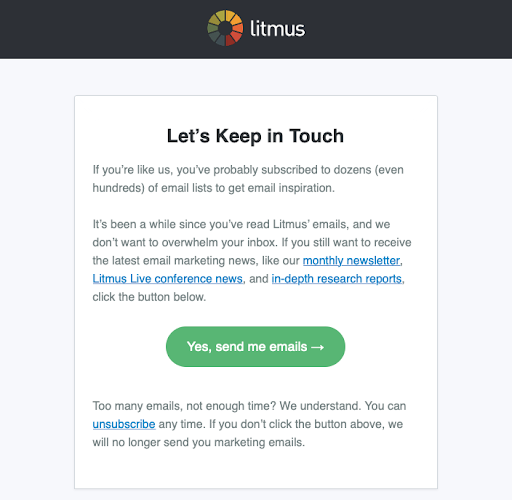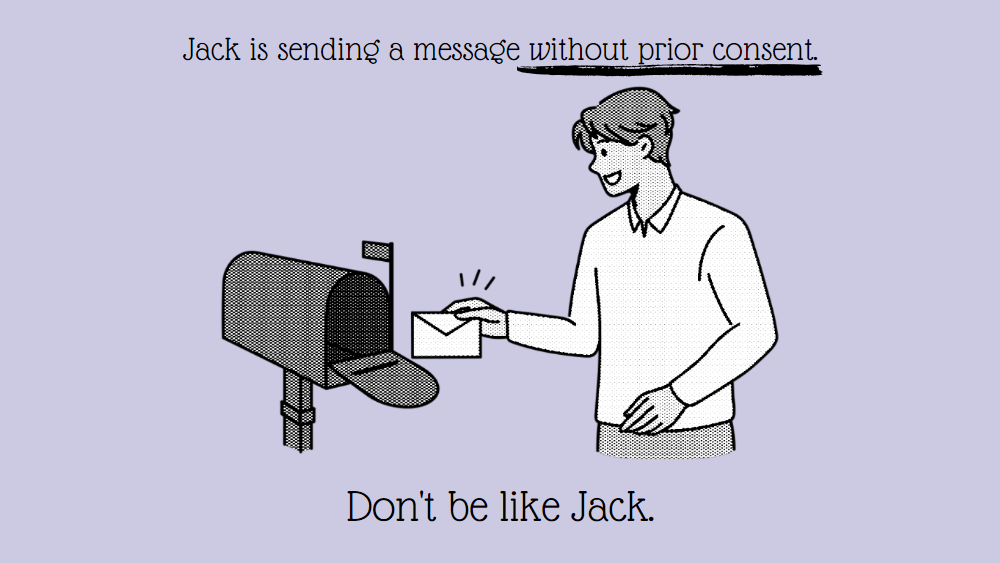No, you cannot send marketing emails without consent. It is illegal and violates privacy laws.
Marketing emails are a powerful tool for businesses. But, sending emails without consent can lead to legal trouble. Laws like GDPR and CAN-SPAM protect people from unwanted emails. Understanding these rules is crucial for any marketer. This blog will explain the importance of email consent.
It will also cover the consequences of ignoring these laws. By the end, you will know how to build a compliant and effective email marketing strategy. So, let’s dive in and explore the world of email marketing consent.
Introduction To Marketing Emails
Sending marketing emails is a common practice for businesses. These emails help companies reach potential customers and promote their products or services. But can you send marketing emails without the recipient’s consent? This is a critical question for many marketers. Let’s dive into the world of marketing emails.
What Are Marketing Emails?
Marketing emails are messages sent to individuals to promote products, services, or events. They aim to build relationships with potential or current customers. These emails can take various forms:
- Promotional emails
- Newsletters
- Special offers
- Event invitations
Marketing emails are a powerful tool. They can increase brand awareness, drive sales, and keep customers engaged.
Importance Of Consent
Gaining consent before sending marketing emails is crucial. Consent ensures that recipients want to receive your messages. This practice has several benefits:
| Benefit | Description |
|---|---|
| Legal Compliance | Following laws like GDPR and CAN-SPAM. |
| Higher Engagement | Recipients are more likely to open and read emails. |
| Better Reputation | Maintaining trust and credibility with your audience. |
Sending emails without consent can lead to serious consequences. These include legal penalties and damage to your brand’s reputation. Always ensure you have clear and explicit permission from your recipients.

Credit: manifestwebsitedesign.com.au
Legal Frameworks
Sending marketing emails without consent can land businesses in hot water. It’s crucial to understand the legal frameworks that govern email marketing. These laws protect consumers from unwanted emails and help maintain trust in digital communication.
Can-spam Act
The CAN-SPAM Act sets the rules for commercial emails in the United States. It requires businesses to follow specific guidelines:
- Include a clear and conspicuous unsubscribe mechanism.
- Do not use deceptive subject lines or false headers.
- Identify the email as an advertisement.
- Include the sender’s valid physical postal address.
Violating the CAN-SPAM Act can result in hefty fines. Each separate email in violation can cost up to $43,280.
Gdpr Regulations
The General Data Protection Regulation (GDPR) applies to businesses operating within the European Union. It has stringent rules on email marketing:
- Obtain explicit consent before sending emails.
- Provide a clear and simple way to withdraw consent.
- Ensure transparency about data usage.
- Respect the right to be forgotten.
Failing to comply with GDPR can lead to severe penalties. Fines can reach up to €20 million or 4% of annual global turnover, whichever is higher.
Consequences Of Non-compliance
Sending marketing emails without consent can lead to serious consequences. These can impact your business financially and harm your reputation. It is crucial to understand these risks to avoid them.
Fines And Penalties
Non-compliance with email marketing laws can result in hefty fines. Various countries have strict regulations in place. For example, the GDPR in Europe can impose fines up to 20 million euros. The CAN-SPAM Act in the USA also includes severe penalties. Businesses must ensure they comply with these laws to avoid financial losses.
Reputation Damage
Sending unsolicited emails can damage your business reputation. Customers may view your emails as spam. This can lead to a loss of trust and credibility. A damaged reputation can result in fewer business opportunities. Maintaining customer trust is essential for long-term success.

Credit: manifestwebsitedesign.com.au
Obtaining Consent
Sending marketing emails without consent can lead to legal troubles. Obtaining consent is crucial. It builds trust and ensures compliance with laws.
There are various methods to obtain consent. Some methods are more effective than others.
Opt-in Methods
Opt-in methods are ways to get users to agree to receive emails.
There are two main types:
- Single Opt-In: The user signs up and immediately gets added to your list.
- Double Opt-In: The user signs up, then confirms via email.
Single opt-in is simpler but can lead to fake sign-ups. Double opt-in is more secure but adds an extra step.
Double Opt-in
Double opt-in involves two steps:
- The user signs up with their email address.
- The user receives a confirmation email and clicks a link to confirm.
This method ensures the email address is valid. It also confirms the user genuinely wants to receive your emails.
Benefits of double opt-in include:
- Higher quality list: Reduces fake sign-ups and spam traps.
- Legal compliance: Meets strict regulations like GDPR.
- Better engagement: Users who confirm are more likely to engage with your emails.
Using double opt-in may reduce your initial sign-ups. But the quality of your list will improve.
Best Practices For Email Marketing
Sending marketing emails without consent can harm your business reputation. Following best practices ensures compliance and builds trust with your audience. Here are some best practices for email marketing:
Clear And Transparent Messaging
Always be clear about your intentions. State the purpose of your email upfront. Use simple language to explain why you are contacting them. Avoid misleading subject lines. Let your subscribers know what to expect in your emails. Transparency builds trust and reduces complaints.
Easy Unsubscribe Options
Make it easy for subscribers to opt out. Include an unsubscribe link in every email. Place it in a visible location. Ensure the process is simple and quick. Do not require users to log in or take multiple steps. Respect their decision to leave. This keeps your email list clean and engaged.

Credit: www.litmus.com
Exceptions To Consent Requirement
Understanding the consent requirement for marketing emails is crucial. But, there are some exceptions where you might not need explicit consent. These exceptions can help streamline your marketing efforts while staying compliant. Let’s explore these exceptions to consent requirement.
Transactional Emails
Transactional emails are an exception to the consent requirement. These emails provide information about a transaction. For example, order confirmations, shipping notifications, or password resets. They are essential for customer service. Because they are not promotional, they do not need prior consent.
Existing Business Relationships
Another exception is when you have an existing business relationship. If a customer has bought from you, you can send marketing emails. This is based on the idea of implied consent. But, the content must be relevant to the previous transactions. Always offer an easy opt-out option to respect their preferences.
Tools For Compliance
Sending marketing emails without consent can lead to legal trouble. But, there are tools available to help you stay compliant. Using these tools ensures you respect your subscribers’ rights and avoid fines.
Email Marketing Platforms
Email marketing platforms help manage your email campaigns. They offer features like list segmentation and automated emails. These platforms also provide tools to track and store consent. This ensures you send emails only to those who have opted in.
Popular platforms include MailChimp, Constant Contact, and SendinBlue. These services offer built-in compliance tools. They help you create consent forms and manage subscribers. This makes it easier to stay within legal boundaries.
Consent Management Systems
Consent Management Systems (CMS) help track and manage user consent. They store records of when and how consent was given. This helps prove compliance if needed.
CMS tools integrate with your website and email platforms. They ensure all user interactions are recorded. Examples include OneTrust, TrustArc, and Cookiebot. These systems provide detailed logs and reporting features. They help ensure you meet legal requirements.
Future Trends In Email Marketing Laws
Email marketing laws are changing rapidly. These changes affect how businesses communicate with their customers. Understanding future trends in email marketing laws is vital. It ensures compliance and builds trust with your audience.
Evolving Privacy Laws
Privacy laws are becoming stricter. Many countries are updating their regulations. For example, the GDPR in Europe sets high standards for consent. Businesses must get clear permission before sending marketing emails.
Other countries are following suit. The CCPA in California gives consumers more control over their data. Similar laws are emerging in other states and countries. Staying updated with these changes is crucial. It helps avoid fines and legal issues.
Impact Of Ai And Automation
AI and automation are transforming email marketing. They help create personalized and targeted campaigns. This improves engagement and conversion rates.
Using AI, businesses can analyze data better. They can understand customer behavior and preferences. Automation tools schedule emails at optimal times. This maximizes open and click rates.
However, AI and automation come with challenges. They must be used responsibly. Ensuring compliance with privacy laws is key. Transparency and consent remain essential. Always inform customers how their data will be used.
Frequently Asked Questions
Is Consent Required For Marketing Emails?
Yes, consent is required for marketing emails. Without explicit permission, sending marketing emails can be illegal in many regions.
What Happens If I Send Emails Without Consent?
Sending emails without consent can result in fines. It may also damage your brand’s reputation and increase spam complaints.
How Do I Get Email Marketing Consent?
To get email marketing consent, use opt-in forms. Clearly explain what subscribers will receive and ensure they willingly agree.
Can I Send Emails To Existing Customers?
You can send emails to existing customers if they have given prior consent. Always check specific laws in your region.
Conclusion
Sending marketing emails without consent can lead to serious issues. Legal trouble. Damaged reputation. It’s always best to get permission first. Respect your audience’s choice. Trust grows from transparency. Engage willingly. Build a loyal customer base. Use ethical practices. Stay compliant and succeed.



Leave a Reply